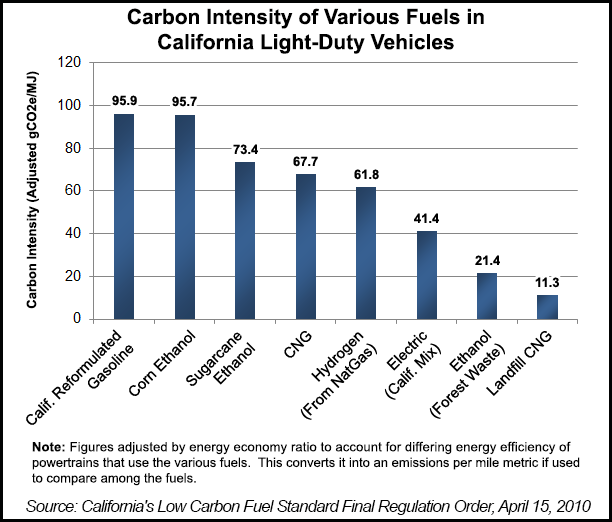Infrastructure | NGI All News Access
A Niche Within the NGV Niche: Renewable Natural Gas Examined
For climate change and alternative transportation fuel advocates, renewable natural gas (RNG) may eventually be the fuel of choice, but right now even its advocates note there are challenges to making a reality out of vehicles fueled by a combination of landfill, digester and waste treatment gas supplies.

“There are substantial challenges for RNG,” said Harrison Clay, president of Clean Energy Fuels Corp.’s Clean Energy Renewables unit, on a webinar last Tuesday called “Renewable Natural Gas Gets Real.” The challenges are particularly telling on the production side, where the cost of production exceeds the price of conventionally produced natural gas in the national pipeline grid, Clay said.
“The price of conventional natural gas is at historic lows, and pretty much everyone I know in the industry thinks the prices will stay at historic lows,” Clay said. “So RNG production costs are obviously higher than conventional natural gas prices.”
RNG production costs currently vary from $5 to $12/MMBtu, said Clay, noting the lower part of the range are large scale landfill gas or digester projects, and the higher prices are the relatively smaller-scale waste treatment and other projects.
Clean Energy uses a “green premium” to overcome the cost advantages, offering buyers federal and California state credits for the use of a renewable fuel. “California’s low-carbon fuel standard has been a good source of revenue for us,” Clay said. “We earn credits for every gallon of RNG that we sell in the state.”
There are also corporate sustainability goals nationally, and companies that use RNG as a fleet fuel can help attain their sustainability goals, he said. “That’s another means of capturing some economics on the sale of the fuel.”
Under the federal renewable fuel program, traditional petroleum fuel retailers over time will be mandated to sell more renewable fuels, and today biomethane vehicle fuels qualify under this program.
“The low-carbon fuel standard in California has been a great program for Clean Energy,” Clay said. “We have generated and sold about $11 million of low-carbon fuel standard credits to date. There are considerable carbon reduction advantages from RNG. You can actually create a negative carbon emissions situation with biomethane, assuming that the fuel is unregulated.”
By capturing the methane from agricultural operations and other sources that are not mandated, a double credit is achieved by clearing volumes of “naturally occurring carbon” and using it to displace petroleum products, Clay said.
Longer term, however, Clay acknowledges that a complex set of regulations will determine how widespread the use of RNG in transportation becomes. For example, California regulators are reassessing the carbon intensity ratings of various fuels, and Clean Energy is urging them to keep RNG ratings as they are.
Among the developments in the natural gas vehicle (NGV) space at the end of January, the Ottawa, Canada-based Biogas Association noted that blending 10% RNG with compressed natural gas (CNG) is an economical way for waste haulers to expand the environmental and cost benefits of operating natural gas truck fleets. The Canadian association is preparing for its upcoming workshop, “Closing the Loop,” on biogas (March 25-26) in Hamilton, Ontario.
Meanwhile, the latest NGV equipment advances include a new breakaway CNG fueling coupler made by Delaware-based OPW CleanEnergy Fueling Products Co. It is designed to protect workers and equipment in the event of accidental drive-off events. And in Salt Lake City, Blu LNG installed a new president, James Burns, who is committed to advancing the fueling equipment made by Blu, including better LNG tanks. It includes technology to deal with boiloff at fueling stations.
In terms of NGV milestones, Ryder Systems Inc., a strong advocate for alternative fuel use in fleet and rental vehicles (see Daily GPI, April 4, 2011), has logged more than 30 million miles with its natural gas-fueled trucks. The Ryder fleet consists of LNG and CNG trucks operating in nine states and various parts of Canada. Since deploying its NGV program in 2011, Ryder has replaced about 4.6 million gallons of diesel fuel, a company spokesperson said.
© 2024 Natural Gas Intelligence. All rights reserved.
ISSN © 1532-1231 | ISSN © 2577-9877 |
